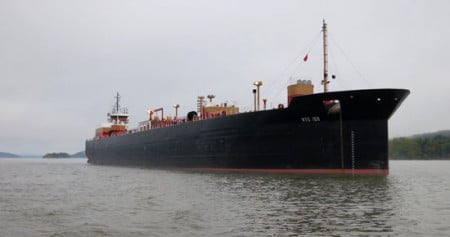Keep frack waste off American rivers – demand an environmental review

Tanker on the Hudson River believed to be carrying fracked crude oil from North Dakota
View more images on our Flickr site
The U.S. Coast Guard has issued a proposed “policy letter” that would allow shale gas extraction waste (or “frack waste”) to be shipped in bulk via barge on all American waterways, including the Hudson and Delaware Rivers.
Without having performed an environmental review, the Coast Guard inexplicably concluded that shipping high volumes of frack waste over ecologically sensitive waters would result in no “significant cumulative impacts on the human environment,” no “substantial controversy” and no “substantial change to existing environmental conditions.”
Your voice in this matter is extremely important to show the Coast Guard that its proposal is controversial. You can tell the Coast Guard it should review the potential adverse impacts that frack waste shipment could have on human health and ecosystems nationwide and demand that the Coast Guard issue strong regulations to close loopholes that would undermine governmental oversight of frack waste shipment.
Comments must be submitted to the U.S. Coast on or before December 6, 2013, at 5:00 p.m. Please email comments to Dr. Cynthia A. Znati at [email protected]. IMPORTANT: Make sure you include in the subject line and at the top of your comment: Docket # – USCG 2013 0915.
Sample Language:
Subject: Comments on Proposed Coast Guard Policy, Docket # – USCG 2013 0915.
Dr. Cynthia A. Znati
Docket Management Facility (M-30)
U.S. Department of Transportation, West Building
Ground Floor, Room W12-140
1200 New Jersey Avenue SE
Washington, D.C. 20590-0001
Re: Docket Number USCG -2013-0915
Dear Dr. Znati,
I request the Coast Guard not approve the proposed policy letter to permit shale gas extraction wastewater (“frack waste”) to be carried on the Nation’s rivers, including the Hudson and Delaware Rivers, because the Coast Guard has not adequately reviewed the environmental impacts of barging frack waste, and because its proposed governmental oversight would be insufficient to protect human health and the environment.
Billions of gallons of wastewater are produced by shale gas extraction yearly. I am concerned that the plans to allow transport of contaminated and dangerous frack waste on barges throughout our region and the waterways of the country could result in adverse environmental impacts that have not been adequately considered.
Frack waste is highly toxic and, according to the Coast Guard, contains so much radioactivity that it requires special handling. If spilled into a river the toxic components can contaminate drinking water supplies and be deadly to fish and aquatic life. Venting can release dangerous air pollution, impacting public health and wildlife. Routine handling of wastewater tanks can overexpose workers to radioactivity. Accidents and spills do happen, especially with increased traffic, and can result in catastrophic harm as well as degradation to water quality, habitats and ecosystems due to cumulative impacts. Without a full assessment of those risks, the Coast Guard cannot sufficiently mitigate potential impacts.
The Coast Guard’s proposed policy is insufficient because:
* The policy is not binding on the regulated public, allowing the Coast Guard to substitute other regulatory measures at its discretion. The policy should be encoded as a federal regulation in order to create uniformly protective and enforceable standards.
* The Coast Guard may, at its discretion, relieve barge owners of the duty to test frack waste for toxicity or radioactivity prior to shipment. The constituents of frack wastes vary by driller and geographic region, so testing of each shipment is necessary to understand hazards. Ongoing monitoring for radioactivity or chemical release on barges is not required but should be.
* The Coast Guard will not require barge owners to submit all testing results directly to the Coast Guard, and therefore the information will be unavailable to the public. Worse, the Coast Guard will allow proprietary information about frack chemicals to be kept secret from the public, keeping the crews and first responders in the dark about what is being transported. All testing results should be submitted to the Coast Guard and immediately published.
* The Coast Guard would allow venting of hazardous gasses from frack waste in order to protect worker safety which is important, but the policy should also be designed to measure and control emissions that could impact the public, wildlife and the environment.
* The Coast Guard has not subjected the policy to adequate scientific review. Cumulative impacts, including upstream and downstream effects of this proposal have not been, but should be, included in a robust environmental analysis to include the extraction, production, and ground or pipeline transport of the wastewater to barge locations as well as the impacts from storage, processing or “disposal” of this waste at its temporary and/or final destination. Alternatives to the barge carriage should also be analyzed.
* The public participation process is deeply flawed due to a very short 30 day comment period (that is further reduced by holidays and a five day system shutdown at the website portal where comments are submitted), due to the lack of any public discussion of input from other agencies that have relevant responsibilities, such as the Environmental Protection Agency and due to the opaque administrative procedure utilized that avoids a more participatory and transparent rulemaking process.
For these reasons, and more, I request you do not approve this policy letter, that you proceed with a full environmental review under the National Environmental Policy Act for this activity, and that you extend the public comment period on the policy letter to 120 days so that the public can be given necessary time to provide information on the record and to influence your decision.
Sincerely,
[Your Name]
